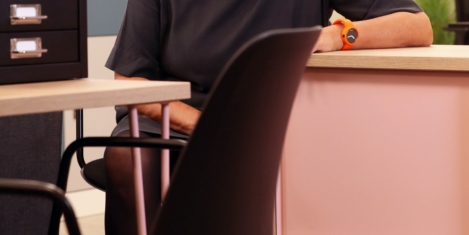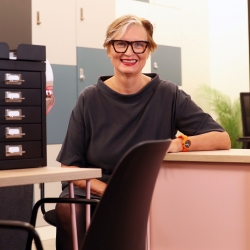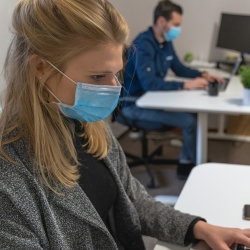To provide the best experiences, we use technologies like cookies to store and/or access device information. Consenting to these technologies will allow us to process data such as browsing behaviour or unique IDs on this site. Not consenting or withdrawing consent, may adversely affect certain features and functions.
The technical storage or access is strictly necessary for the legitimate purpose of enabling the use of a specific service explicitly requested by the subscriber or user, or for the sole purpose of carrying out the transmission of a communication over an electronic communications network.
The technical storage or access is necessary for the legitimate purpose of storing preferences that are not requested by the subscriber or user.
The technical storage or access that is used exclusively for statistical purposes.
The technical storage or access that is used exclusively for anonymous statistical purposes. Without a subpoena, voluntary compliance on the part of your Internet Service Provider, or additional records from a third party, information stored or retrieved for this purpose alone cannot usually be used to identify you.
The technical storage or access is required to create user profiles to send advertising, or to track the user on a website or across several websites for similar marketing purposes.
 A new research report released by Siemens Smart Infrastructure, titled ‘A New Space Race,’ has highlighted the increasingly urgent need to transform global infrastructure to focus on adaptability, resiliency and decarbonisation. Data from the report claims infrastructure leaders worldwide recognise the need for digitalisation to tackle challenges in energy systems and the built environment. (more…)
A new research report released by Siemens Smart Infrastructure, titled ‘A New Space Race,’ has highlighted the increasingly urgent need to transform global infrastructure to focus on adaptability, resiliency and decarbonisation. Data from the report claims infrastructure leaders worldwide recognise the need for digitalisation to tackle challenges in energy systems and the built environment. (more…)








 The brains behind
The brains behind 
 Parents who feel shame about childcare responsibilities eating into their work-time are less productive when they are working than those who do not feel ashamed, according to new research by
Parents who feel shame about childcare responsibilities eating into their work-time are less productive when they are working than those who do not feel ashamed, according to new research by 
 The latest research from
The latest research from 
 People in the UK feel overwhelmed by the amount of data available to them when making critical decisions at work, according to a new study by
People in the UK feel overwhelmed by the amount of data available to them when making critical decisions at work, according to a new study by 
 With more than 13.5 million workers having returned to their place of work for at least one day a week, more than four million say that they do not feel entirely safe doing so, claims new research by
With more than 13.5 million workers having returned to their place of work for at least one day a week, more than four million say that they do not feel entirely safe doing so, claims new research by 
 The health charity claims that, in the last fortnight, less than half (49 percent) of the 2,000 UK workers surveyed believed there was a designated first aider in their workplace.
The health charity claims that, in the last fortnight, less than half (49 percent) of the 2,000 UK workers surveyed believed there was a designated first aider in their workplace. 
 There are no prizes to be won for saying that the modern workplace is already markedly different from those we have known in recent decades. As remote and flexible working practices have become more common, the role of the office has already begun to evolve – the pace of change has been greatly accelerated by the pandemic, which has resulted in a rethink among many organisations about their real estate needs.
There are no prizes to be won for saying that the modern workplace is already markedly different from those we have known in recent decades. As remote and flexible working practices have become more common, the role of the office has already begun to evolve – the pace of change has been greatly accelerated by the pandemic, which has resulted in a rethink among many organisations about their real estate needs. 
 Pressing the ‘reset’ button is never easy. But I’m a firm believer that, once we do, we become much less averse than we perhaps expected to the change it inevitably brings. This is particularly true of the past eighteen months. From all of the sadness and hardship endured, we are beginning to emerge into a new, changed way of living. One that is both familiar and altogether different. The dichotomy is particularly evident in our workplaces. For many sections of the economy, the office was the ecosystem of our daily working lives. Initial questions of whether the office would survive quickly fell by the wayside, and a more interesting, nuanced, debate of what we want the office to be began.
Pressing the ‘reset’ button is never easy. But I’m a firm believer that, once we do, we become much less averse than we perhaps expected to the change it inevitably brings. This is particularly true of the past eighteen months. From all of the sadness and hardship endured, we are beginning to emerge into a new, changed way of living. One that is both familiar and altogether different. The dichotomy is particularly evident in our workplaces. For many sections of the economy, the office was the ecosystem of our daily working lives. Initial questions of whether the office would survive quickly fell by the wayside, and a more interesting, nuanced, debate of what we want the office to be began. 
 In a survey of UK cyber security, IT and business professionals commissioned by
In a survey of UK cyber security, IT and business professionals commissioned by 








November 19, 2021
Workplace data proves that the devil is in the detail for the new era of work
by Steve Morren • Comment, Flexible working, Technology, Workplace design